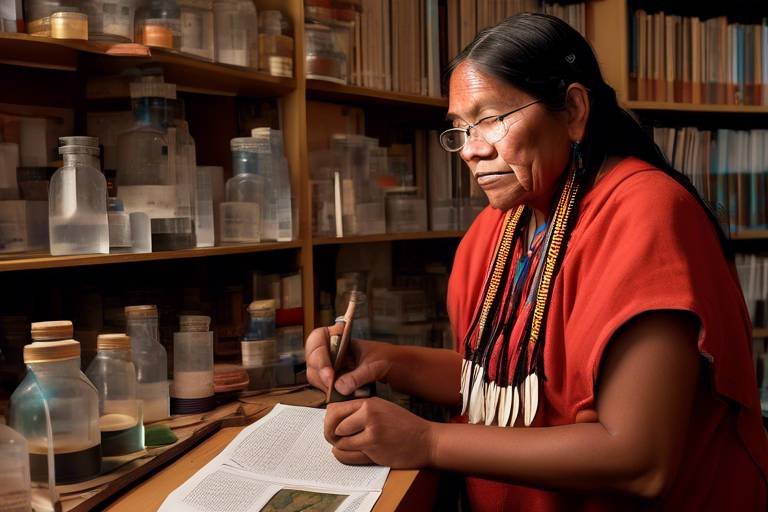The Role of Indigenous Knowledge in Scientific Research
This article explores the significance of indigenous knowledge systems and their integration into scientific research, highlighting the benefits of collaboration between indigenous communities and researchers for sustainable solutions.
Indigenous knowledge encompasses unique insights and practices developed over generations, offering valuable perspectives that can enhance scientific understanding and contribute to more effective research outcomes. These knowledge systems are deeply rooted in the cultural, social, and environmental contexts of indigenous peoples, making them a treasure trove of information that has often been overlooked by mainstream science. Imagine a vast library filled with books that have never been read; this is akin to the wealth of knowledge that indigenous communities hold, often waiting to be discovered and utilized in ways that benefit both science and society.
Integrating indigenous knowledge into scientific research fosters collaboration, creating a holistic approach that respects cultural practices and enhances the relevance of research findings to local communities. When researchers engage with indigenous communities, they do not just gain access to traditional ecological knowledge; they also build relationships based on trust and mutual respect. This partnership is crucial because it allows for a more comprehensive understanding of complex issues, such as climate change and biodiversity loss. By combining scientific methods with indigenous insights, researchers can develop solutions that are not only scientifically sound but also socially acceptable and culturally appropriate.
Numerous case studies demonstrate the successful incorporation of indigenous knowledge in various fields, showcasing its potential to inform environmental management, health practices, and conservation efforts. For instance, in the realm of environmental management, indigenous practices have led to the preservation of biodiversity and sustainable land-use practices. In health, traditional medicinal knowledge has been integrated into modern healthcare systems, providing alternative treatments that resonate with cultural beliefs. These examples highlight the transformative power of collaboration between indigenous peoples and scientists, where both parties learn from each other and contribute to a greater understanding of our world.
Indigenous practices in environmental management provide sustainable solutions that have been proven effective over time, offering insights into biodiversity conservation and ecosystem resilience. For example, fire management techniques used by indigenous communities have been shown to reduce the risk of wildfires while promoting healthy ecosystems. This age-old wisdom can be likened to a well-tuned orchestra, where each instrument plays its part to create a harmonious balance in nature. When researchers tap into this knowledge, they can develop strategies that not only protect the environment but also empower local communities.
Traditional health practices rooted in indigenous knowledge can complement modern medicine, offering alternative treatments and holistic approaches to wellness that respect cultural beliefs. For instance, the use of herbal remedies and spiritual healing methods can provide additional layers of care for individuals seeking treatment. This integration can be compared to a patchwork quilt, where each piece—traditional and modern—comes together to create a comprehensive approach to health. By acknowledging and respecting indigenous health practices, researchers can contribute to more effective healthcare solutions that resonate with the communities they serve.
Despite its benefits, integrating indigenous knowledge into scientific research faces challenges, including cultural misunderstandings, intellectual property issues, and the need for mutual respect and trust. Often, researchers may inadvertently overlook the significance of cultural practices, leading to misinterpretations or the commodification of indigenous knowledge. This situation underscores the importance of approaching research with humility and a genuine desire to learn. By fostering open dialogue and understanding, researchers can navigate these challenges and build meaningful partnerships with indigenous communities.
Establishing strong partnerships between researchers and indigenous communities is essential for successful integration, fostering mutual respect and collaboration that can lead to meaningful research outcomes. These partnerships are not just about sharing knowledge; they are about recognizing the value of indigenous perspectives and ensuring that their voices are heard in the research process. It’s like a dance, where both partners must be in sync to create something beautiful and impactful.
Ethical considerations must be prioritized when working with indigenous communities, ensuring that their rights, knowledge, and cultural practices are respected throughout the research process. Researchers must be aware of the historical context of exploitation and marginalization that many indigenous peoples have faced. This awareness should guide their approach, ensuring that research is conducted in a manner that honors the dignity of indigenous communities. It’s essential to create frameworks that protect indigenous knowledge and promote equitable sharing of benefits arising from research.
Empowering indigenous voices in research not only enriches scientific inquiry but also supports the preservation of cultural heritage and promotes social justice within the scientific community. By valuing indigenous perspectives, researchers can contribute to a more inclusive and equitable scientific landscape. This empowerment can be likened to planting seeds in a garden; when nurtured, these seeds can grow into a diverse and vibrant ecosystem, benefiting everyone involved.
- What is indigenous knowledge? Indigenous knowledge refers to the unique insights and practices developed by indigenous communities over generations, often based on their cultural and environmental contexts.
- How can indigenous knowledge benefit scientific research? Integrating indigenous knowledge can enhance scientific understanding, provide sustainable solutions, and ensure that research findings are relevant to local communities.
- What are some challenges in integrating indigenous knowledge? Challenges include cultural misunderstandings, intellectual property issues, and the need for mutual respect and trust between researchers and indigenous communities.
- Why is ethical consideration important in research with indigenous communities? Ethical considerations are crucial to ensure that the rights, knowledge, and cultural practices of indigenous peoples are respected and protected throughout the research process.

The Importance of Indigenous Knowledge
Indigenous knowledge is a treasure trove of insights and practices that have been cultivated over countless generations. This knowledge is not merely a collection of facts; it embodies a deep understanding of the environment, ecosystems, and social structures that have evolved in harmony with nature. Think of it as a finely tuned instrument, perfectly attuned to the rhythms of the land and its resources. When integrated into scientific research, indigenous knowledge can significantly enhance our understanding of complex issues, offering perspectives that mainstream science might overlook.
One of the most compelling aspects of indigenous knowledge is its contextual relevance. Indigenous communities have lived in specific environments for centuries, developing practices that are uniquely suited to their local conditions. This localized knowledge can inform scientific research in profound ways. For example, indigenous farmers often possess intricate knowledge of soil types, weather patterns, and crop cycles that can lead to more sustainable agricultural practices. By collaborating with these communities, researchers can tap into a wealth of information that may otherwise remain hidden.
Moreover, the integration of indigenous knowledge into scientific frameworks fosters a holistic approach to problem-solving. Traditional ecological knowledge encompasses not just the biological aspects of ecosystems but also their cultural, spiritual, and social dimensions. This holistic view can lead to more effective and sustainable solutions to pressing global challenges, such as climate change and biodiversity loss. For instance, indigenous practices related to fire management have been shown to enhance ecosystem resilience, demonstrating the potential benefits of blending traditional methods with contemporary scientific approaches.
However, it’s crucial to recognize that indigenous knowledge is not static. It evolves with the community and its changing environment. This dynamism means that researchers must engage with indigenous communities as equal partners, respecting their knowledge systems and ensuring that their voices are heard in the research process. Such collaboration can lead to innovative solutions that are both scientifically sound and culturally appropriate.
In summary, the importance of indigenous knowledge cannot be overstated. By embracing this rich tapestry of understanding, researchers can unlock new avenues for inquiry, enhance the relevance of their work, and ultimately contribute to a more sustainable future. The fusion of traditional wisdom and modern science not only enriches the research landscape but also honors the profound connection that indigenous peoples have with their land and resources.

Integration of Indigenous Knowledge in Research
Integrating indigenous knowledge into scientific research is not just a trend; it’s a necessary evolution in how we approach understanding the world around us. Imagine standing at the crossroads of ancient wisdom and modern science—this is where the magic happens. By weaving together these two strands of knowledge, researchers can create a rich tapestry that enhances our understanding of complex issues. This integration fosters collaboration, creating a holistic approach that respects cultural practices while enhancing the relevance of research findings to local communities.
One of the most profound aspects of integrating indigenous knowledge is the way it encourages a dialogue between scientists and indigenous communities. This dialogue opens doors to new perspectives and methodologies that might otherwise be overlooked. For instance, indigenous communities often possess a deep understanding of local ecosystems, having observed and interacted with them for generations. When researchers tap into this knowledge, they gain insights that can lead to more effective and sustainable solutions. It’s like having a seasoned guide on a treacherous hike; their experience can help you avoid pitfalls and navigate more effectively.
Moreover, integrating indigenous knowledge into research can lead to outcomes that are not only scientifically sound but also culturally appropriate. This is crucial in areas such as environmental management and health practices, where one-size-fits-all solutions often fail. By acknowledging and respecting indigenous practices, researchers can develop strategies that are tailored to the specific needs and values of the community. This approach not only enhances the efficacy of research but also builds trust and rapport between researchers and indigenous peoples.
However, the integration process is not without its challenges. It requires a commitment to mutual respect and understanding. Researchers must be willing to learn from indigenous communities, recognizing that their knowledge is not merely supplementary but foundational. This requires a shift in mindset—moving away from viewing indigenous knowledge as anecdotal or primitive and towards recognizing it as a sophisticated system of understanding that has stood the test of time.
To illustrate the potential of this integration, let’s take a look at some key areas where indigenous knowledge has made a significant impact:
| Field | Indigenous Contribution | Research Outcome |
|---|---|---|
| Environmental Management | Traditional ecological knowledge | Enhanced biodiversity conservation strategies |
| Health Practices | Holistic health approaches | Improved community health outcomes |
| Agriculture | Crop rotation and biodiversity practices | Increased resilience to climate change |
In conclusion, the integration of indigenous knowledge into scientific research is a journey worth embarking on. It not only enriches the research process but also paves the way for sustainable solutions that honor the traditions and wisdom of indigenous peoples. As we continue to face complex global challenges, the collaboration between indigenous communities and researchers will be essential in crafting solutions that are both effective and respectful of cultural heritage.
- What is indigenous knowledge?
Indigenous knowledge refers to the understanding and practices developed by indigenous communities over generations, often deeply tied to their cultural identity and environment.
- Why is integrating indigenous knowledge important?
It enriches scientific research by providing unique insights that can lead to more effective and culturally relevant solutions to various issues.
- What challenges exist in integrating indigenous knowledge?
Challenges include cultural misunderstandings, intellectual property issues, and the need for trust and mutual respect between researchers and indigenous communities.

Case Studies of Successful Integration
When we talk about the successful integration of indigenous knowledge into scientific research, we are not just discussing theory; we are diving into real-world examples that have made a significant impact. These case studies serve as powerful reminders of how collaboration can lead to innovative solutions that respect and honor traditional practices. One remarkable instance comes from the realm of environmental conservation in the Amazon rainforest, where indigenous tribes have been pivotal in protecting biodiversity. Their deep understanding of the ecosystem, honed over centuries, has guided researchers in implementing sustainable practices that not only preserve the environment but also empower local communities.
Another compelling case is found in the field of health, particularly in the treatment of chronic illnesses. Indigenous healers in various regions have worked alongside medical researchers to document traditional remedies that have been effective for generations. This collaboration has led to the development of new treatments that blend modern medicine with ancient wisdom, offering patients holistic options that resonate with their cultural beliefs. For instance, the use of specific herbs and plants known to indigenous peoples has been scientifically validated, allowing for a richer, more effective approach to health care.
Furthermore, the integration of indigenous knowledge has proven essential in climate change research. In the Arctic, indigenous communities have been at the forefront of documenting changes in wildlife patterns and environmental shifts due to climate change. Their observations provide critical data that help scientists understand the broader implications of these changes. By combining traditional ecological knowledge with modern scientific methods, researchers have been able to create comprehensive models that predict future environmental scenarios, ultimately leading to more effective conservation strategies.
To illustrate these points further, here is a table summarizing some key case studies:
| Field | Case Study | Outcome |
|---|---|---|
| Environmental Conservation | Amazon Rainforest Protection | Enhanced biodiversity preservation through indigenous practices. |
| Health | Traditional Remedies | Development of holistic treatment options combining modern and traditional medicine. |
| Climate Change | Arctic Indigenous Observations | Improved predictive models for environmental changes based on local knowledge. |
These examples highlight the incredible potential of integrating indigenous knowledge into scientific research. It's not just about adding a layer of understanding; it's about creating a richer, more nuanced perspective that can lead to groundbreaking solutions. The collaboration between indigenous communities and researchers not only benefits scientific inquiry but also strengthens the cultural fabric of the communities involved, ensuring that their voices are heard and respected.
- What is indigenous knowledge? Indigenous knowledge refers to the unique insights, practices, and experiences developed by indigenous peoples over generations, often related to their environment, health, and culture.
- How can indigenous knowledge enhance scientific research? By integrating indigenous knowledge, researchers can gain valuable perspectives that lead to more effective and culturally relevant solutions, particularly in fields like environmental management and health.
- What are some challenges in integrating indigenous knowledge? Challenges include cultural misunderstandings, intellectual property issues, and the need for mutual respect and trust between indigenous communities and researchers.
- Why is it important to empower indigenous voices in research? Empowering indigenous voices not only enriches scientific inquiry but also helps preserve cultural heritage and promotes social justice within the scientific community.

Environmental Management
Indigenous practices in environmental management are not merely traditional rituals; they are a treasure trove of knowledge honed over centuries. These practices offer sustainable solutions that have proven effective in maintaining biodiversity and ensuring ecosystem resilience. Imagine a vast forest, where every tree has a story, every river has a rhythm, and every animal plays a role in the grand tapestry of life. Indigenous communities have been the stewards of these ecosystems, utilizing their profound understanding of natural processes to manage resources wisely.
One of the key aspects of indigenous environmental management is the concept of holistic stewardship. This approach recognizes the interconnectedness of all living things and emphasizes the need for balance in ecosystems. For instance, traditional fire management techniques employed by Indigenous Australians have been shown to reduce the risk of catastrophic wildfires while promoting the growth of native species. These methods are often based on a deep understanding of seasonal changes and animal behaviors, which can be overlooked by modern scientific approaches.
Furthermore, indigenous knowledge systems often include practices such as crop rotation, polyculture, and the use of natural pest control, which can significantly enhance agricultural sustainability. By integrating these practices into contemporary environmental management strategies, researchers can create more resilient agricultural systems that not only yield better crops but also protect the soil and biodiversity.
To illustrate the impact of indigenous knowledge on environmental management, consider the following table that summarizes some traditional practices and their benefits:
| Indigenous Practice | Benefits |
|---|---|
| Controlled burns | Prevents larger wildfires, promotes new growth of native plants |
| Traditional fishing methods | Ensures sustainable fish populations, respects breeding cycles |
| Herbal medicine | Utilizes local plants for health, supports biodiversity |
Moreover, indigenous communities often have a spiritual connection to the land, viewing themselves as part of a larger ecosystem rather than separate from it. This perspective fosters a sense of responsibility that drives sustainable practices. When researchers collaborate with these communities, they gain access to a wealth of knowledge that can enhance scientific understanding and lead to more effective environmental management strategies.
In conclusion, integrating indigenous knowledge into environmental management is not just beneficial; it is essential for creating sustainable solutions that respect both the environment and the cultural values of indigenous peoples. By recognizing and valuing these practices, we can work towards a future where both scientific inquiry and indigenous wisdom harmoniously coexist, paving the way for healthier ecosystems and communities.
- What is indigenous knowledge? Indigenous knowledge refers to the unique insights and practices developed by indigenous communities over generations, rooted in their cultural traditions and experiences.
- How can indigenous knowledge benefit scientific research? Integrating indigenous knowledge can enhance research outcomes by providing valuable perspectives, promoting sustainability, and ensuring that research is relevant to local communities.
- What are some challenges in integrating indigenous knowledge? Challenges include cultural misunderstandings, intellectual property concerns, and the need for mutual respect and trust between researchers and indigenous communities.
- Why is it important to empower indigenous voices in research? Empowering indigenous voices enriches scientific inquiry, supports the preservation of cultural heritage, and promotes social justice within the scientific community.

Health Practices
When we think about health, it's often easy to get caught up in the latest medical advancements or pharmaceutical breakthroughs. However, the wisdom of indigenous knowledge offers a refreshing perspective that emphasizes the importance of holistic approaches to wellness. Traditional health practices, deeply rooted in the cultural contexts of indigenous communities, provide valuable insights that can complement modern medicine in ways that are both effective and respectful of cultural beliefs.
Indigenous health practices are not just remedies; they are a way of life. They encompass a wide range of techniques, from herbal medicine to spiritual healing, all of which have been refined over generations. For instance, many indigenous cultures view health as a balance between the physical, mental, and spiritual aspects of life. This holistic view contrasts sharply with the often compartmentalized approach of Western medicine, which can lead to a more comprehensive understanding of health and well-being.
One of the most fascinating aspects of indigenous health practices is their reliance on natural resources. Many indigenous communities have developed extensive knowledge about local flora and fauna, understanding which plants can be used for healing and how to prepare them effectively. For example, the use of willow bark as a natural pain reliever predates modern aspirin, showcasing the profound understanding of natural remedies that these communities possess. This connection to nature not only promotes physical health but also fosters a sense of community and belonging, which is crucial for mental and emotional well-being.
Moreover, integrating these traditional practices with modern healthcare can lead to more effective treatments. Here are some ways in which indigenous health practices can enhance contemporary medicine:
- Complementary Treatments: Indigenous practices can offer alternative treatments that may work alongside conventional medicine, providing patients with a broader range of options.
- Cultural Sensitivity: Understanding and respecting indigenous health practices can improve patient outcomes by fostering trust and cooperation between healthcare providers and indigenous patients.
- Preventive Care: Many indigenous health practices focus on prevention through lifestyle and dietary choices, which can be invaluable in addressing chronic health issues.
However, it’s essential to approach this integration with care. There are ethical considerations to keep in mind, such as ensuring that indigenous communities retain ownership of their knowledge and practices. Researchers and healthcare providers must prioritize building relationships based on mutual respect and understanding. By doing so, they can create an environment where indigenous voices are not only heard but are integral to the health discourse.
In conclusion, the intersection of indigenous knowledge and modern health practices presents an exciting opportunity for innovation in healthcare. By embracing these traditional methods, we can develop more inclusive and effective health strategies that honor the rich cultural heritage of indigenous peoples. As we continue to explore this integration, let’s remember that health is not just about treating illness; it’s about fostering a complete sense of well-being that encompasses body, mind, and spirit.
- What are indigenous health practices? Indigenous health practices are traditional methods of healing that have been developed and passed down through generations within indigenous communities, often focusing on holistic approaches to well-being.
- How can indigenous knowledge improve modern healthcare? By integrating indigenous knowledge, healthcare can become more culturally sensitive, offer complementary treatment options, and emphasize preventive care strategies.
- Are there ethical concerns when integrating indigenous knowledge into research? Yes, it is crucial to ensure that indigenous communities retain ownership of their knowledge and that their cultural practices are respected throughout the research process.

Challenges in Integrating Indigenous Knowledge
Integrating indigenous knowledge into scientific research is not without its hurdles. One of the most significant challenges is the presence of cultural misunderstandings. Often, researchers from outside indigenous communities may not fully grasp the cultural nuances or the importance of certain practices, leading to misinterpretations. This disconnect can result in a lack of trust, which is crucial for effective collaboration. Imagine trying to solve a puzzle without having all the pieces; that's what it feels like when researchers overlook the rich context of indigenous knowledge.
Another major challenge revolves around intellectual property issues. Indigenous communities have their own systems of knowledge ownership, which may clash with Western notions of intellectual property rights. Researchers must navigate these complex waters carefully, ensuring that the rights of indigenous peoples are respected. It's a bit like walking a tightrope—one misstep can lead to significant repercussions for both parties involved.
Additionally, the need for mutual respect and trust cannot be overstated. Building these essential elements takes time and effort, and without them, the integration process may falter. Researchers often come with their own agendas, which may not align with the priorities of indigenous communities. This misalignment can create friction and hinder the collaborative spirit needed for successful research.
To illustrate these challenges further, consider the following table that outlines specific obstacles faced during the integration of indigenous knowledge:
| Challenge | Description |
|---|---|
| Cultural Misunderstandings | Researchers may misinterpret indigenous practices, leading to mistrust. |
| Intellectual Property Issues | Conflicts may arise regarding the ownership of traditional knowledge. |
| Mutual Respect and Trust | Building trust takes time, and without it, collaboration can fail. |
Despite these challenges, the potential benefits of integrating indigenous knowledge into scientific research are immense. Overcoming these obstacles requires a commitment to understanding and respecting the cultural contexts in which this knowledge exists. By addressing these challenges head-on, researchers can pave the way for more effective and inclusive scientific practices.
- What is indigenous knowledge? Indigenous knowledge refers to the understanding and practices developed by indigenous communities over generations, encompassing their relationship with the environment, health, and cultural traditions.
- Why is it important to integrate indigenous knowledge into scientific research? Integrating indigenous knowledge can enhance scientific understanding, provide culturally relevant solutions, and foster collaboration that respects local practices.
- What are the main challenges in integrating indigenous knowledge? Some challenges include cultural misunderstandings, intellectual property issues, and the need for mutual respect and trust between researchers and indigenous communities.

Building Partnerships with Indigenous Communities
Establishing strong partnerships between researchers and indigenous communities is not just a matter of collaboration; it’s about building bridges of trust, respect, and mutual understanding. Imagine a vibrant tapestry woven from threads of diverse knowledge systems, where each thread represents the unique experiences and insights of indigenous peoples. This intricate design not only enhances the quality of scientific research but also ensures that the contributions of indigenous communities are acknowledged and valued. When researchers approach indigenous communities with humility and an open mind, they unlock a treasure trove of wisdom that can lead to groundbreaking discoveries and sustainable solutions.
To foster these partnerships effectively, it is crucial to prioritize **communication** and **engagement**. Researchers must take the time to listen to the voices of indigenous community members, understanding their perspectives, concerns, and aspirations. This two-way dialogue creates a foundation of trust, which is essential for successful collaboration. It’s like planting a seed; with the right care and attention, it can grow into a strong and fruitful relationship. Furthermore, recognizing the importance of cultural practices and traditional knowledge in the research process is vital. This respect not only enriches the research but also empowers indigenous communities by affirming their identity and heritage.
Moreover, researchers should consider the **long-term impacts** of their work on indigenous communities. This means engaging in projects that are not only scientifically sound but also socially responsible. It’s about ensuring that the benefits of research extend beyond academic publications and into the hands of the communities involved. For instance, when environmental studies are conducted, researchers can work alongside indigenous peoples to develop strategies that not only protect the environment but also enhance the livelihoods of those who depend on it. This collaborative approach leads to **sustainable outcomes** that reflect the values and needs of both parties.
Another essential aspect of building partnerships is the recognition of intellectual property rights. Indigenous knowledge is often deeply intertwined with cultural identity, and it is crucial for researchers to ensure that this knowledge is treated with the respect it deserves. Establishing clear agreements regarding the use of indigenous knowledge can help prevent exploitation and ensure that communities benefit from the research conducted in their territories. This is akin to setting the rules of a game before playing; it ensures that everyone is on the same page and that the outcomes are fair and equitable.
In conclusion, building partnerships with indigenous communities is a multifaceted process that requires dedication, respect, and a willingness to learn. By embracing the rich tapestry of indigenous knowledge and working collaboratively, researchers can create a more inclusive and effective scientific landscape. This not only enhances research outcomes but also contributes to the preservation of cultural heritage and supports the rights of indigenous peoples. In the end, it’s about creating a symbiotic relationship where both researchers and indigenous communities thrive together, paving the way for a brighter and more sustainable future.
- Why is it important to build partnerships with indigenous communities in scientific research?
Building partnerships ensures that indigenous knowledge is respected and integrated into research, leading to more relevant and effective outcomes. - What are the challenges faced when integrating indigenous knowledge?
Challenges include cultural misunderstandings, intellectual property issues, and the need for mutual respect and trust. - How can researchers effectively engage with indigenous communities?
Researchers can engage by actively listening, respecting cultural practices, and ensuring that the benefits of research extend to the communities involved.

Ethical Considerations
When embarking on research that involves indigenous communities, it is crucial to prioritize . This means recognizing and respecting the rights of indigenous peoples, their knowledge systems, and cultural practices. Researchers must approach these communities with a mindset of humility and openness, understanding that they are not merely subjects of study but partners in a collaborative journey towards knowledge creation. It's like navigating a delicate dance where both parties must be in sync to avoid missteps that could lead to mistrust or harm.
One of the primary ethical concerns is the issue of informed consent. Researchers should ensure that indigenous community members fully understand the purpose of the research, the methods being used, and how the findings will be applied. This transparency fosters trust and empowers communities to make informed decisions about their participation. Additionally, it is essential to acknowledge that consent is not a one-time event; it should be an ongoing dialogue throughout the research process.
Moreover, the concept of intellectual property is another significant ethical consideration. Indigenous knowledge is often communal and tied to cultural heritage, which raises questions about ownership and rights. Researchers must navigate this landscape carefully, ensuring that any knowledge shared is done so with the explicit permission of the community. This could involve establishing agreements that outline how the knowledge will be used, credited, and protected. It's akin to borrowing a book from a friend; you wouldn't want to claim it as your own or lend it out without their permission.
Furthermore, ethical research must also address the potential for cultural appropriation. This occurs when elements of indigenous culture are used without permission or understanding, often stripping away their significance. Researchers should strive to engage with communities in ways that honor their traditions and values, rather than exploiting them for personal or professional gain. This requires a genuine commitment to building relationships based on mutual respect and understanding.
To illustrate these ethical considerations, let's look at some key principles that can guide researchers:
| Principle | Description |
|---|---|
| Respect | Honor the rights and traditions of indigenous communities. |
| Transparency | Maintain open communication about research goals and methods. |
| Consent | Ensure informed and ongoing consent from community members. |
| Collaboration | Work together with indigenous communities, valuing their input. |
| Protection | Safeguard the intellectual property rights of indigenous knowledge. |
In conclusion, addressing ethical considerations in research involving indigenous communities is not just a checkbox on a list; it is a fundamental aspect that can shape the success and impact of the research. By fostering ethical partnerships, researchers can ensure that their work not only contributes to scientific knowledge but also uplifts and empowers indigenous voices.
- What is indigenous knowledge? Indigenous knowledge refers to the unique insights and practices developed by indigenous communities over generations, encompassing their understanding of the environment, health, and culture.
- Why is ethical consideration important in research? Ethical considerations are vital to ensure that the rights, knowledge, and cultural practices of indigenous communities are respected, fostering trust and collaboration.
- How can researchers ensure informed consent? Researchers should provide clear information about the research purpose, methods, and potential impacts, and maintain open communication throughout the process.
- What are the risks of cultural appropriation? Cultural appropriation can lead to the exploitation of indigenous cultures, stripping away their significance and leading to mistrust between researchers and communities.

Empowering Indigenous Voices
Empowering indigenous voices in research is not just about inclusion; it's about recognizing the invaluable contributions that indigenous communities can bring to the table. When researchers actively seek to incorporate the knowledge and perspectives of these communities, they open the door to a wealth of insights that can significantly enhance scientific inquiry. Imagine trying to solve a complex puzzle without all the pieces; that’s often what happens when indigenous knowledge is overlooked. By engaging with indigenous peoples, researchers can tap into a rich tapestry of historical and ecological understanding that has been cultivated over generations.
One of the most profound benefits of empowering indigenous voices is the preservation of cultural heritage. Many indigenous communities have unique languages, rituals, and practices that are deeply intertwined with their understanding of the world. When these voices are included in research, it not only validates their experiences but also helps to ensure that their cultural narratives are not lost in the modern rush for data and results. This collaboration can lead to a more respectful and meaningful exchange, where both scientific and indigenous knowledge systems inform each other.
Moreover, empowering indigenous voices promotes social justice within the scientific community. Historically, indigenous communities have faced marginalization and exploitation in various forms of research. By acknowledging their rights and contributions, researchers can help to rectify past injustices and build a more equitable framework for future collaborations. This is not merely a moral obligation; it also enriches the research process, as diverse perspectives lead to more comprehensive and innovative solutions to global challenges.
To truly empower indigenous voices, researchers must adopt a framework that prioritizes collaboration and mutual respect. This involves establishing long-term partnerships rather than one-off projects. Researchers should engage with community leaders and members to co-design research initiatives that reflect the community's needs and priorities. Such an approach not only enhances the relevance of the research but also fosters a sense of ownership among indigenous communities. After all, when people feel they have a stake in the research process, they are more likely to contribute valuable insights and support the outcomes.
In addition to collaboration, it is essential to provide indigenous communities with the necessary tools and resources to engage in research actively. This could include training programs that enhance their research skills or funding opportunities that allow them to pursue their own inquiries. By investing in these communities, researchers can help build local capacity and ensure that indigenous knowledge continues to thrive alongside scientific advancements.
Ultimately, empowering indigenous voices is about creating a dialogue—a two-way street where both scientists and indigenous communities can learn from each other. This dialogue can lead to innovative solutions that are not only scientifically sound but also culturally appropriate and sustainable. As we move forward, it is crucial to remember that the integration of indigenous knowledge is not an add-on; it is a fundamental aspect of creating meaningful and impactful research that respects and honors the wisdom of those who have long been stewards of the land.
- Why is it important to include indigenous voices in research? Including indigenous voices enriches research by providing unique insights and perspectives that have been developed over generations.
- How can researchers build trust with indigenous communities? Building trust involves establishing long-term partnerships, respecting cultural practices, and ensuring that communities have a say in the research process.
- What are the challenges faced when integrating indigenous knowledge? Challenges include cultural misunderstandings, intellectual property issues, and the need for mutual respect and trust between researchers and indigenous communities.
Frequently Asked Questions
- What is indigenous knowledge?
Indigenous knowledge refers to the unique insights, practices, and understandings developed by indigenous communities over generations. It encompasses their relationship with the environment, cultural practices, and traditional wisdom that has been passed down through oral traditions.
- How can indigenous knowledge benefit scientific research?
Integrating indigenous knowledge into scientific research can enhance understanding of local ecosystems, promote sustainable practices, and provide valuable perspectives that traditional scientific methods may overlook. This collaboration often leads to more effective and culturally relevant research outcomes.
- Can you provide examples of successful integration of indigenous knowledge?
Absolutely! There are numerous case studies where indigenous knowledge has been successfully integrated into environmental management, such as using traditional ecological practices for biodiversity conservation. In health practices, traditional healing methods have complemented modern medicine, offering holistic approaches that respect cultural beliefs.
- What challenges exist in integrating indigenous knowledge into research?
Some challenges include cultural misunderstandings, issues surrounding intellectual property rights, and the need for mutual trust and respect between researchers and indigenous communities. It's crucial to navigate these challenges carefully to foster genuine collaboration.
- How can researchers build partnerships with indigenous communities?
Building partnerships requires open communication, respect for cultural practices, and a commitment to ethical research practices. Researchers should engage with indigenous communities from the outset, ensuring that their voices are heard and integrated into the research process.
- What ethical considerations should researchers keep in mind?
Researchers must prioritize the rights and cultural practices of indigenous communities. This includes obtaining informed consent, respecting traditional knowledge, and ensuring that research benefits the community involved. Ethical considerations are essential for building trust and fostering long-term relationships.
- Why is it important to empower indigenous voices in research?
Empowering indigenous voices enriches scientific inquiry and helps preserve cultural heritage. It promotes social justice and ensures that research is relevant and beneficial to the communities involved, creating a more equitable scientific landscape.


















